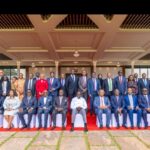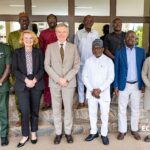Eid Amid Grief: Kareem-Adigun Sends Sallah Greetings, Mourns Mokwa Flood Victims, Urges Urgent National Action.
By Raymond Enoch
As Nigerians mark the 2025 Eid al-Kabir festivities, the joyous celebrations are marred by sorrow in the wake of the devastating floods that struck Mokwa, Niger State. Former President of the Nigeria Association of Women Journalists (NAWOJ) and prominent media figure, Hajia Fatimah Ajibola Kareem-Adigun, has issued a heartfelt Sallah message intertwined with a powerful condolence statement and a national call to action.
In a press release shared with newsrooms across the country, Kareem-Adigun extended her Sallah greetings to President Bola Ahmed Tinubu, Vice President Kashim Shettima, Muslims nationwide, and all Nigerians, while expressing profound grief for the victims of the Mokwa disaster.
“My heart is heavy as I extend my deepest condolences to the people of Mokwa, home and abroad, who have suffered unimaginable loss,” she wrote. “We mourn with every family who has lost loved ones, homes, livelihoods, and a sense of safety.”
The recent floods in Mokwa — a town traversed by merchants, students, corps members, and travelers — have reignited national conversations on climate change, rural infrastructure fragility, and emergency preparedness. Kareem-Adigun noted the wider implications of the tragedy, emphasizing that this is not an isolated incident, but a wake-up call.
“This disaster has once again exposed the growing threat posed by climate change,” she stated. “Nevertheless, we must not shy away from the fragile state of the infrastructure in our rural, semi-urban and urban areas.”
She commended the efforts of the National Emergency Management Agency (NEMA), volunteers, and responders for their swift intervention, describing their actions as “a service of love and selflessness that gives us hope.”
However, she urged all three tiers of government to move beyond temporary relief, calling for structural reforms in drainage systems, sustainable urban planning, and long-term flood mitigation across Nigeria.
“Nigerians, irrespective of ethnic, faith, gender, political or social status deserve safety, dignity, and proactive governance,” she said. “Together, we must demand the change that protects our future collectively as a people.”
Kareem-Adigun’s message ends on a note of national unity, resilience, and collective responsibility, offering both a prayer and a call for transformative action.
“With sincerity of purpose and genuine sense of national unity, please accept my sympathy. Together, we will rebuild.”
As Eid al-Kabir offers an occasion for sacrifice and reflection, her message resonates as both a somber tribute and a rallying cry — one urging Nigeria to rise to the challenge of safeguarding lives in an age of growing environmental uncertainty.










